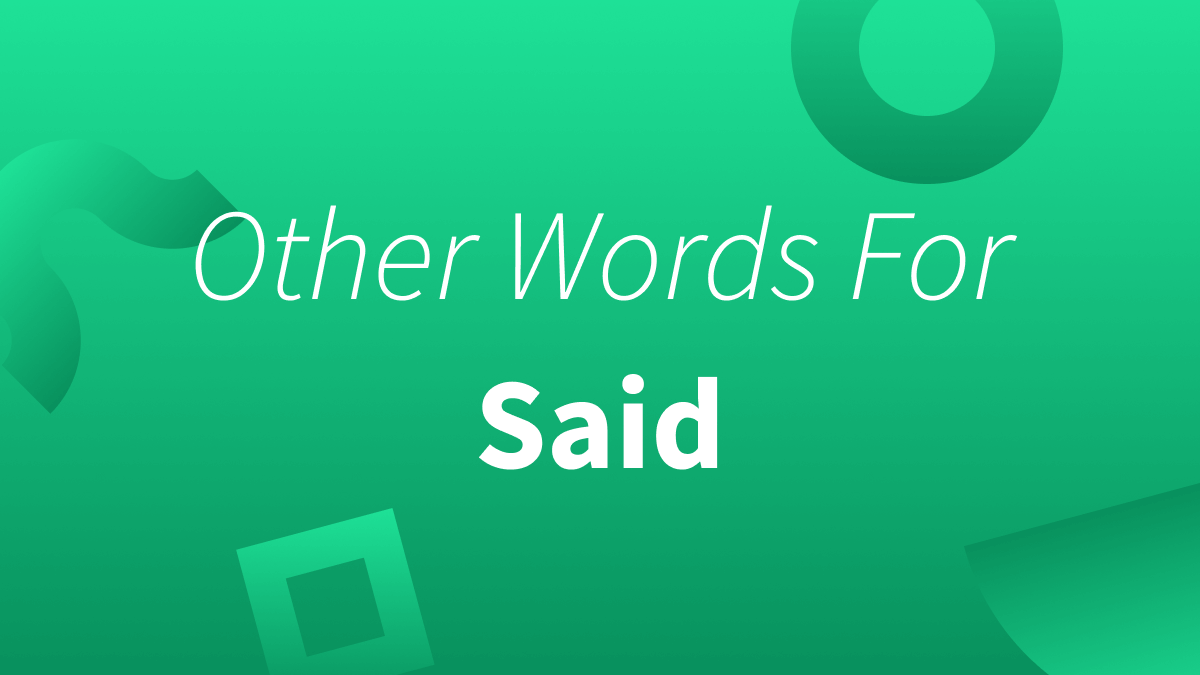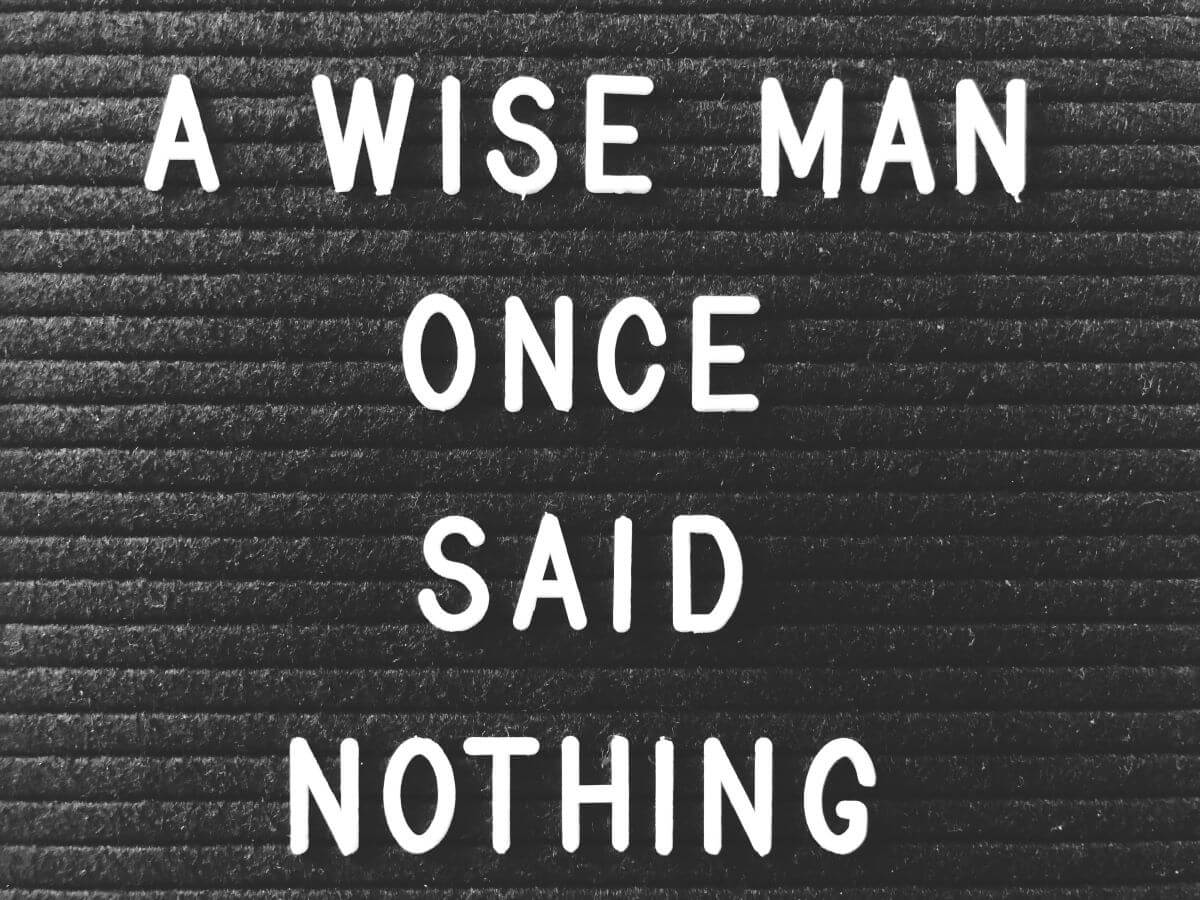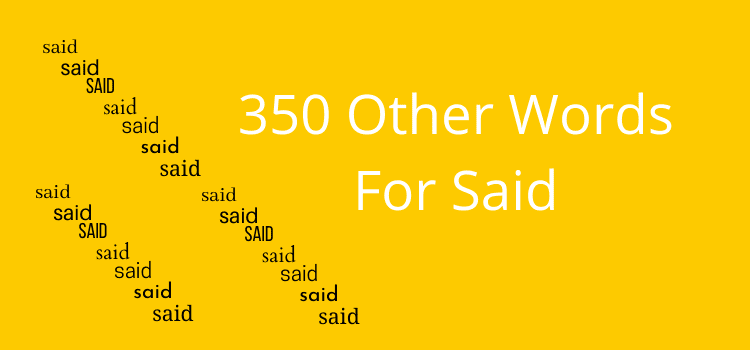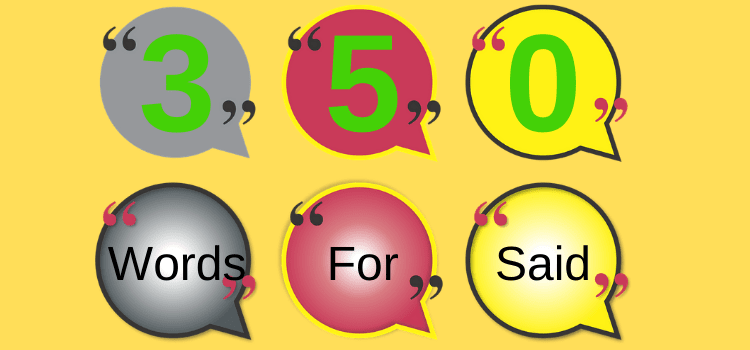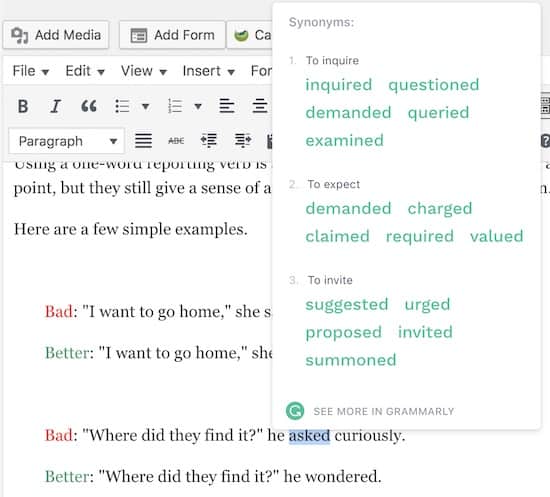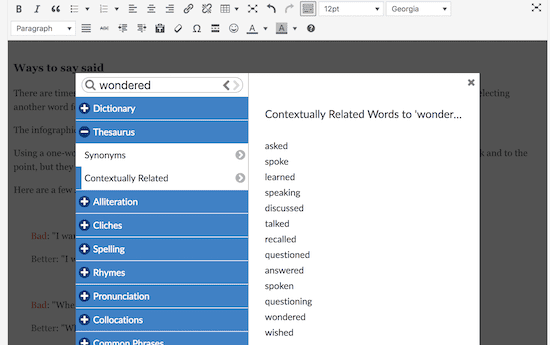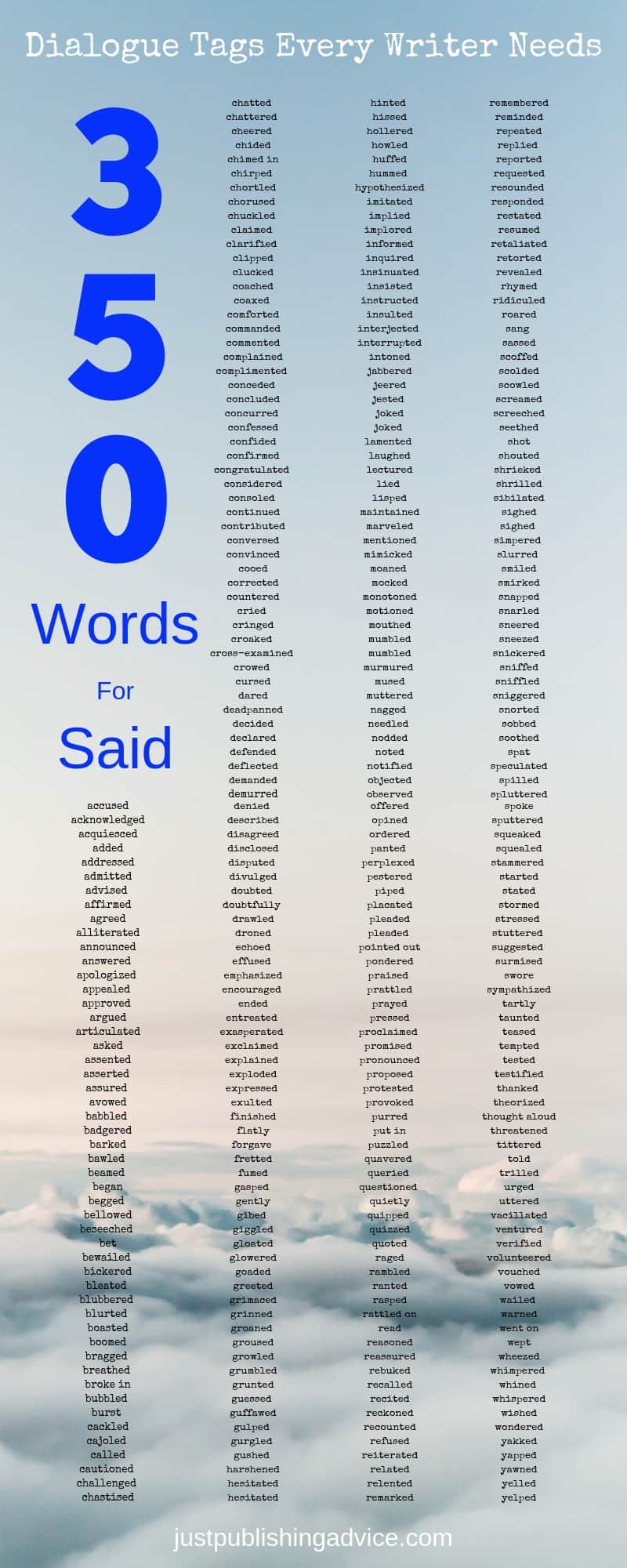One of the words that comes up most commonly in various types of writing, from fiction to academic writing, is the word “said.” Any time a writer is referencing the words or thoughts expressed by another person, whether that be thoughts expressed verbally or in writing, an appropriate way to introduce—or attribute—that person’s thoughts is with the phrase “said.”
But if you’re incorporating a lot of quotations in your writing, you might find yourself repeating the word “said” a lot. Repeating the same phrase in a piece of writing can start to feel monotonous, which is why incorporating synonyms or an oft-used word or phrase can make your writing more interesting and accurate. But here’s some good news: there are tons of other words for “said” out there for you to use!
To help you build a repertoire of words to replace “said,” we’re going to do the following in this article:
- Explain the importance of using word variety and avoiding repetition of the same word in your writing
- Explain when to use “said” and when not to use “said”
- Provide a comprehensive list of alternative words for “said,” organized into categories based on emotion and intention
Ready to check out some synonyms for “said”? Then let’s get going!
To give you the most comprehensive and easy-to-navigate list, we’ve organized our list into two main categories: first, we’re including several lists of other words for “said” by emotion, and second, we’re including several lists of different words for “said” by intention or action. You can decide what meaning you’re trying to express in your writing, and use our lists accordingly!
Happy Words to Use Instead of “Said”
We’re going to kick off our list by giving you a lot of other words for “said” by emotion, starting with synonyms for “said” that convey a happy, joyful, or positive tone.
|
Applauded |
Congratulated |
Prattled |
|
Approved |
Consoled |
Preened |
|
Assured |
Cooed |
Proclaimed |
|
Babbled |
Crowed |
Professed |
|
Bantered |
Encouraged |
Promised |
|
Beamed |
Giggled |
Quipped |
|
Blathered |
Greeted |
Reassured |
|
Blithered |
Hooted |
Reckoned |
|
Boasted |
Jabbered |
Remarked |
|
Bragged |
Jested |
Remembered |
|
Bubbled |
Joked |
Sang |
|
Cheered |
Laughed |
Smiled |
|
Chortled |
Marveled |
Soothed |
|
Chorused |
Nodded |
Spoke |
|
Chuckled |
Offered |
Teased |
|
Comforted |
Piped |
Vowed |
|
Confided |
Praised |
Yakked |
Sad Words to Use Instead of “Said”
Sadness is a common emotion expressed in writing—let’s look at a few synonyms for “said” that convey sadness.
|
Bawled |
Gurgled |
Sobbed |
|
Choked |
Moaned |
Wailed |
|
Coughed |
Sighed |
Wept |
|
Cried |
Sniffed |
Whimpered |
|
Groaned |
Sniffled |
Whined |
Angry Words to Replace “Said”
There are a ton of synonyms for “said” that express anger, and we’ve included several of them for you here.
|
Accused |
Disparaged |
Rejected |
|
Badgered |
Fumed |
Reprimanded |
|
Barked |
Griped |
Reproached |
|
Bellowed |
Groused |
Roared |
|
Berated |
Growled |
Sassed |
|
Boomed |
Grunted |
Scoffed |
|
Censured |
Harassed |
Scolded |
|
Chastised |
Hissed |
Scorned |
|
Chided |
Hollered |
Shouted |
|
Clucked |
Interrupted |
Smirked |
|
Commanded |
Jeered |
Snapped |
|
Complained |
Jibed |
Snarled |
|
Corrected |
Mocked |
Sneered |
|
Criticized |
Muttered |
Snickered |
|
Demanded |
Nagged |
Snorted |
|
Denied |
Ranted |
Stormed |
|
Deried |
Rebuked |
Taunted |
|
Dismissed |
Rebuffed |
Threatened |
Different Words for “Said” That Express Shock or Surprise
When you want to communicate a tone of shock or surprise in your writing, try using these synonyms for “said”!
|
Blurted |
Gawked |
Spouted |
|
Divulged |
Leered |
Started |
|
Exclaimed |
Let slip |
Wondered |
|
Gaped |
Ogled |
|
|
Gasped |
Spilled |
Other Words for “Said” That Express Fear
The last emotion it might be helpful to be able to express accurately and vividly in your writing is fear. Here’s a list of synonyms for “said” that you can use to demonstrate a feeling of fear.
|
Agonized |
Hesitated |
Shrilled |
|
Begged |
Implored |
Shuddered |
|
Beseeched |
Mumbled |
Spluttered |
|
Blanched |
Murmured |
Spooked |
|
Bleated |
Paled |
Sputtered |
|
Brooded |
Panicked |
Squeaked |
|
Cautioned |
Panted |
Stammered |
|
Confessed |
Pleaded |
Started |
|
Cowered |
Quaked |
Tensed |
|
Cringed |
Quavered |
Trembled |
|
Croaked |
Quivered |
Warned |
|
Faltered |
Recoiled |
Whispered |
|
Fretted |
Screamed |
Worried |
|
Gasped |
Shivered |
Yelped |
|
Gulped |
Shrieked |
Words to Replace “Said” That Are Expository
If you’re working with a quote in which the speaker is clarifying information or explaining something, you can try out these words instead of “said”!
|
Added |
Depicted |
Rejoined |
|
Advised |
Elucidated |
Remarked |
|
Answered |
Explained |
Replied |
|
Clarified |
Illuminated |
Responded |
|
Defined |
Illustrated |
Retorted |
|
Delineated |
Portrayed |
Returned |
Other Words for “Said” That Are Argumentative
When you incorporate quotes or dialogue that make an argument, use these synonyms for “said” in your attributions.
|
Advanced |
Claimed |
Insisted |
|
Appealed |
Contended |
Maintained |
|
Argued |
Corroborated |
Posited |
|
Attested |
Countered |
Proposed |
|
Authenticated |
Declared |
Refuted |
|
Bespoke |
Defended |
Substantiated |
|
Certified |
Emphasized |
|
|
Challenged |
Held |
Words to Use Instead of “Said” That Are Critical
If a speaker in a quote or piece of dialogue is forming a critique, incorporate one of these different words for “said” in your attribution.
|
Analyzed |
Critiqued |
Gauged |
|
Appraised |
Estimated |
Interposed |
|
Assayed |
Evaluated |
Interpreted |
|
Assessed |
Examined |
Judged |
|
Concluded |
Explicated |
Reviewed |
|
Considered |
Figured |
Surveyed |
Words to Use Instead of “Said” That Are Implicative
Try using these alternative words for “said” that imply meaning.
|
Adumbrated |
Hinted |
Predicted |
|
Alluded |
Implied |
Professed |
|
Connoted |
Indicated |
Signaled |
|
Foreshadowed |
Insinuated |
Signified |
|
Forewarned |
Intimated |
Stated |
|
Heralded |
Portended |
Suggested |
Words to Replace “Said” That Seek Information
Sometimes you need to include an attribution that shows a speaker is searching for information. These synonyms for “said” can help you establish a tone of inquisitiveness!
|
Adjured |
Inquired |
Questioned |
|
Asked |
Inspected |
Quizzed |
|
Begged |
Interrogated |
Requested |
|
Demanded |
Perused |
Researched |
|
Exhorted |
Pondered |
Scrutinized |
|
Explored |
Probed |
Searched |
|
Implored |
Queried |
Words to Replace “Said” That Reveal Information
Finally, if you need a word other than “said” that reveals information, try out the options in the list below.
|
Accepted |
Conceded |
Owned |
|
Acknowledged |
Confessed |
Recognized |
|
Admitted |
Disclosed |
Reported |
|
Affirmed |
Divulged |
Revealed |
|
Alleged |
Exposed |
Volunteered |
|
Allowed |
Granted |
|
|
Betrayed |
Imparted |
When to Use Different Words for “Said” in Your Writing…And When Not To
In most cases, deciding when to use words other than “said” in your writing is up to your discretion. But there are actually some situations when it’s correct to use “said” exclusively to attribute a piece of dialogue or a quote in your writing. This depends on the type of writing, so we’re going to break down the situations when you should definitely use “said” here!
Journalism
The first situation where you can expect to see writers exclusively using “said” is in any type of writing that relies on AP Style. “AP” stands for “Associated Press,” and this set of style guidelines is the standard for journalistic writing. This includes writing for newspapers, magazines, and public relations in the United States. AP Style provides a lot of rules about grammar, spelling, punctuation, and language use, and using “said” for quote attribution is one of those rules.
Impartiality and objectivity are two values that are extremely important in journalistic writing. Unlike many synonyms for “said,” which reveal a speaker’s feelings, attitude, or intentions, “said” doesn’t try to interpret the feelings, attitude, or intentions of the speaker. “Said” just states factual information: the words in the quote were spoken by a person or group of people. Using “said” allows the journalist to remain impartial and objective about the information, and it also lets readers interpret the meaning of quoted material on their own.
Technical Writing
While not exactly a rule, using “said” is an unspoken expectation for quote attribution in technical writing. Technical writing is a style of writing used in business environments and some scientific fields, like engineering. It’s important for this style of writing to be clear, specific, and, in most cases, concise. In fact, readers of technical writing appreciate a writer’s ability to communicate directly and plainly by using short, direct words. That’s why “said” is the best choice for introducing quotes or paraphrases in technical writing: it’s clear, specific, and concise.
Creative Writing
Creative writing is a third situation that might require you to think strategically about when to use “said.” In creative writing—like fiction, for instance—when and how often to use “said” is pretty much up for debate. There are a lot of synonyms for “said” that you can use to convey the emotions or intentions of a character in dialogue, but you don’t necessarily have to use some flowery synonym for “said” every time you include a piece of dialogue in creative writing. In fact, sometimes it’s okay to strategically omit attributions altogether.
Here’s one example of a way to present dialogue in creative writing that doesn’t overuse attributions:
She crossed her arms angrily. “So you weren’t planning to tell me about your trip to Paris until after you were already gone?”
“I suppose I didn’t see the point.” Paige shook her head. “It’s not like you would’ve let me go if I’d told you ahead of time.”
“That’s really selfish, Paige.”
Even without attributions for every piece of dialogue in the example above, you can still get an idea of how the characters feel and what their intentions are through the dialogue beats (“She crossed her arms angrily,” and, “Paige shook her head”). Alternatively, dialogue attributions in creative writing are another place where word variety is important. Your attributions are a great way for you to add emotion and imagery to your work. That means sometimes you might simply use “said,” sometimes you might use a more expressive synonym for “said,” and other times you might forego attributions altogether.
Academic Writing
One final writing situation where you’ll find yourself needing to make decisions about when to use “said” is academic, research-based writing. In academic writing, it’s important to be clear about who you are quoting and to provide adequate context for the quote you include. For example, if the scholar you’re quoting is making an argument in the quote you include, it would be more accurate to say, “Dr. Garcia argued” or “Dr. Garcia claimed,” instead of “Dr. Garcia said.” Using a quote attribution that gives your reader a clearer sense of the speaker or writer’s purpose and tone.
3 Reasons Why Word Variety Is Important in Writing
Word variety is important to any type of writing for three main reasons: using a variety of words can make your writing more engaging, more accurate, and more expressive.
First, using a variety of words can make your writing more engaging and interesting for the people who are reading it. In some types of writing, like poetry, repetition is used as a strategic stylistic device. In lots of cases, though, writers repeat the same word because they don’t know its synonyms. After a while, readers might feel a bit exhausted by repetitiveness in a piece of writing. That’s one reason why knowing and using synonyms for commonly repeated words is so important!
Second, word variety can make your writing more accurate. For example, while “said” is always going to accurately describe a piece of dialogue or a quote from an outside source, there are words to use instead of “said” that can reveal the intention behind dialogue or the information conveyed in a quote.
Let’s say you incorporate a quote where the author is disagreeing with a point made by a scholar. Sure, you could introduce that quote with, “Dr. Smith said.” But you could be more accurate by introducing the quote with a word that indicates that the quote is going to express disagreement, like, “Dr. Smith countered” or “Dr. Smith responded.”
Finally, your writing is expressive and vivid when you avoid repetition. When your word choice reflects the emotions or tone expressed by a quote or piece of dialogue that you include in your writing, your readers can get a better sense of your intended meaning. Using synonyms for “said” to create tone and imagery in your writing can help readers better understand your position and make them more willing to buy into your ideas.
What’s Next?
If you’re studying for the verbal portion of your SAT or ACT, we’ve got you covered. Here are our expert guides to the verbal portions of the SAT and ACT, and we even have tips and tricks to help you tackle the essay sections! These are just a few of the tons (and tons!) of resources we have, so be sure to check out our blog for more information.
This cheat sheet for ways to say “said” can be really helpful if you’re starting to write your college admissions essays. Learn how to start your essay off perfectly, and make sure you know the biggest mistakes you should avoid, too.
If you’re using this guide to help you write creatively, you might be a great fit for a creative writing degree! Here’s a guide to the best creative writing colleges and programs in the United States.
Have friends who also need help with test prep? Share this article!
About the Author
Ashley Sufflé Robinson has a Ph.D. in 19th Century English Literature. As a content writer for PrepScholar, Ashley is passionate about giving college-bound students the in-depth information they need to get into the school of their dreams.
If you’ve read our previous post on writing dialogue, you’ll know that you shouldn’t be afraid to default to he said, she said, or they said when you’re tagging your dialogue. After all, it’s probably the clearest, least distracting way to indicate who’s saying what. That being said, it can be useful to deploy a specific and powerful dialogue tag every now and again.
👀
Which dialogue tag are YOU?
Find out in just a minute.
To help you find that perfect synonym to inject action and emotion into your dialogue, here are over 270 other words for said:
Neutral/multi-purpose words
|
Acknowledged Added Agreed Announced Articulated Asserted Backtracked Began Blurted Called Commented Communicated Conferred Considered Contended Declared Denoted |
Drawled Elaborated Emitted Ended Enunciated Expounded Expressed Greeted Interjected Mentioned Noted Observed Orated Persisted Predicted Pronounced Quipped |
Recited Reckoned Related Remarked Repeated Replied Responded Shared Slurred Stated Suggested Told Urged Uttered Vocalized Voiced |
Happy/excited words
|
Approved Babbled Beamed Bubbled Chattered Cheered Chimed in Chortled Chuckled Congratulated |
Complimented Crooned Effused Exclaimed Giggled Grinned Gushed Jabbered Joked |
Laughed Praised Rejoiced Sang Smiled Thanked Tittered Trilled Yammered |
Sad/upset words
|
Agonized Apologized Bawled Blubbered Cried Fretted |
Grieved Groaned Lamented Mewled Moaned Mumbled |
Sobbed Sighed Sniffled Sniveled Wailed Wept |
Angry words
|
Accused Choked Badgered Barked Bellowed Chastised Cursed Demanded Exploded Fumed |
Glowered Growled Hissed Insulted Raged Ranted Reprimanded Roared Scolded |
Screamed Screeched Snarled Spat Shouted Swore Thundered Vociferated Yelled |
Annoyed words
|
Bleated Complained Condemned Criticized Exhaled Groused |
Grumbled Grunted Heaved Insisted Mocked Rasped |
Rejoined Retorted Scoffed Smirked Snapped Whined |
Frightened/pained words
|
Coughed Cautioned Gulped Howled Keened Panted Prayed |
Quavered Screamed Shrieked Shuddered Squalled Squealed Trembled |
Wailed Warbled Whimpered Yelped Yowled Warned |
Prideful words
|
Advertised Bloviated Boasted Boomed Bossed Bragged Broadcasted |
Crowed Exhorted Dictated Gloated Moralized Ordered |
Prattled Preached Sermonized Snorted Swaggered Trumpeted |

FREE COURSE
How to Write Believable Dialogue
Master the art of dialogue in 10 five-minute lessons.
Words to express uncertainty
|
Breathed Doubted Faltered Hesitated Lilted Mumbled |
Murmured Muttered Shrugged Squeaked Stammered |
Stuttered Swallowed Trailed off Vacillated Whispered |
Words that make fun
|
Derided Jeered Heckled Lampooned Mocked |
Mimicked Parodied Ridiculed Satirized Scorned |
Spoofed Sneered Snickered Taunted Teased |
Words that ask a question
|
Asked Begged Challenged Contemplated Guessed Hinted Hypothesized Implied Inquired |
Interrogated Invited Mouthed Mused Pleaded Pondered Probed Proposed Puzzled |
Repeated Requested Requisitioned Queried Questioned Quizzed Solicited Speculated Wondered |
Words that give an answer
|
Accepted Advised Affirmed Alleged Answered Assured Avowed Claimed Conceded Concluded Confided Confirmed |
Explained Disclosed Disseminated Divulged Imparted Informed Indicated Maintained Notified Offered Passed on Proffered |
Promised Promulgated Released Reported Revealed Shared Specified Speculated Supposed Testified Transmitted Verified |
Download this ‘greatest hits’ list
For this infographic, we’ve narrowed down the 270 most essential dialogue words for you to know! Simply enter your email below to get it in your inbox within minutes.

FREE RESOURCE
Get our Dialogue Tag Cheatsheet
Upgrade your dialogue with our list of 270 alternatives to “said.”
To see how master writers assemble their dialogue, head over to our final post in this series for some choice examples of dialogue.
Direct speech can be difficult to smoothly navigate when you’re writing, but if you’re writing a novel or short story, dialogue is almost certainly going to happen at some point. When there is a conversation, the most common thing to do is use “said” when a person speaks:
“Are you crazy?” said Mary.
“Some of the time,” said John.
“Well,” said Mary, “I wish you would give me some warning before you do things like that!”
“I’ll try,” said John.
Then Mary leaned in close and said, “Oh shucks! I love you anyway!”
That’s a whole lot of “said” right there, and it gets repetitive pretty fast, doesn’t it? It becomes essential to have alternatives for the word “said” if you want your writing to sound decent. There are several ways this can be done.
Skip the Bits Outside the Quotation Marks Altogether!
If a conversation involves two people (dialogue), your reader will quickly see the two people are talking. That means that you can introduce your speakers, and then continue the conversation without saying who said what on the assumption your reader will be able to work out who is speaking, at least for a few lines.
Describe Actions Before or After the Quotation Marks
For example: “Oh shucks! I love you anyway!” Mary cuddled closer with a sigh.
In our example, we can clearly see Mary was doing the talking. If John says something next, he’ll get a new paragraph to himself, emphasizing the change of speaker. Voila! Conundrum avoided. “Saying” words have been completely skipped, but we still know who was talking.
Use Words Other than “Said”
Depending on context, there are a whole bunch of alternative words for “said” we can choose. Perhaps Mary’s romantic utterance was:
- Whispered
- Breathed
- Murmured
- Sighed
- Purred
- Blurted
- Gurgled
- Chuckled
- Mumbled
- Warbled
- Simpered
Her opening, “Are you crazy?” could have been:
- Asked (a little weak, but there it is)
- Exclaimed
- Cried
- Yelled
- Squealed
- Screamed
- Shrieked
- Squeaked
- Shouted
- Bellowed
- Roared
- Snapped
- Wailed
- Gasped
- Laughed
- Giggled
- Tittered
- Complained
- Objected
- Protested
- Sobbed
- Groaned
- Grumbled
- Scolded
What’s interesting is all these words imply mood much better than “said” does. Was Mary objecting to John’s actions in a good-humored, frightened or angry way? Your choice of words can tell your reader what her tone of voice was.
And when she told John she loved him anyway, was she feeling romantic or amused? Did she blurt it out unexpectedly, or was she being coy and flirtatious? How did John feel when he responded to her initial protestation? Was he serious or light-hearted?
Changing Moods
Look at how these words change the mood of the conversation:
“Are you crazy?” sobbed Mary.
“Some of the time,” muttered John.
“Well,” Mary complained, “I wish you would give me some warning before you do things like that!”
“I’ll try,” John promised.
Then Mary leaned in close and murmured, “Oh shucks! I love you anyway!”
You should have gained a sense of how the person speaking felt by the way they said it. Now see how changing the “talking” words can change the entire scene:
“Are you crazy?” giggled Mary.
“Some of the time,” chuckled John.
“Well,” Mary laughed, “I wish you would give me some warning before you do things like that!”
“I’ll try,” John grinned.
Then Mary leaned in close and purred, “Oh shucks! I love you anyway!”
Ok, so it’s not great literature. I’d probably have avoided introducing the speaker from about line 3, reintroducing them if the mood changed, or the conversation started to get too long to follow, but you get the idea. Example one is a lovers’ tiff, while example two is a couple having fun together. That’s a big difference, and “said” just wouldn’t have conveyed that.
List of “Said” Words According to Mood
Angry, Tense
- Snapped
- Snarled
- Growled
- Barked (lots of doggy words so far)
- Bellowed (and a moose)
- Roared (and a lion – this one could also imply triumph)
- Grumbled
- Complained
- Objected
- Remonstrated
- Huffed (this one is just mildly exasperated)
- Nagged
- Blustered
- Thundered (and some weather)
- Screamed
- Rasped
- Worried
- Yelled
- Screamed
- Shouted
- Shrieked
- Hollered (a bit of volume in these last few!)
- Seethed
- Ranted
- Fumed
Happy, Amused, Positive
- Laughed
- Chuckled
- Giggled
- Grinned
- Guffawed
- Gurgled
- Joked
- Quipped
- Teased
- Cheered
- Crowed
Certain, Sure, Confident
- Declared
- Asserted
- Announced
- Insisted
- Assured
- Argued
- Bragged
- Boasted
- Stated
- Reassured
- Preached
- Commented
- Remarked
- Confirmed
- Vowed
- Promised
- Observed
Sarcastic, Creepy
- Leered
- Sneered
- Jeered
- Drawled
- Taunted
- Cackled
- Mocked
Asking or Asking for
- Begged
- Pleaded
- Requested
- Questioned
- Queried
- Probed
- Asked (of course)
- Inquired
- Entreated
- Cajoled
- Wheedled
Unsure
- Faltered
- Stammered
- Stuttered
- Hesitated
- Guessed
- Blurted
- Trembled
- Speculated
Tones other than the ones we’ve already covered (especially the loud ones)
- Whispered
- Murmured
- Hissed
- Trilled
- Sang
- Sniffed
- Snivelled
- Mewled
- Moaned
- Purred
- Sobbed
- Groaned
- Moaned
- Grunted
And we’re just scratching the surface…here are a few more:
- Volunteered
- Lied
- Interrupted
- Interjected
- Exclaimed
- Remonstrated
- Finished
And as for “finished,” I realize this list is far from actually being finished. “Said” is all very well, but with so many more expressive words to choose from, you probably don’t need it! Do you have a favorite word to use other than “said” when you write that’s not listed above? Let us know and we’ll add it to our list.
10 “Said” Synonyms You Can Use in All Types of Writing
powered by
LanguageTool
Elevate your writing by adding these ten synonyms of “said” to your vocabulary. They can be more accurate and help you avoid repetitiveness throughout your text.
Other Words You Could Use Instead of “Said”
- Knowing other words you can use in place of said can improve your writing because it adds variety and removes repetitiveness.
- Five formal alternatives of said are: announced, commente, explained, replied, and stated.
- Five creative alternatives of said are: whispered/exclaimed, rambled, chimed, bemoaned, and scolded.
Why You Should Know Other Ways To Say “Said”
Whether you’re writing a formal text or creative text, you may notice that said is a frequently used verb. After all, it denotes information that someone has spoken. Said can be found in essays such as explanatory essays, where the writer has to explain what a source has, well, said.
It’s also found in creative writing to commence a dialogue. Below, you’ll find five alternatives that are perfect for formal settings and five alternatives that are great for creative writing.
Five Other Ways To Say “Said” In Formal Writing
1. Announced
As you might have guessed, this alternative is perfect when you are quoting an announcement.
On Thursday, the Coca-Cola Company said they would be changing the color of their Sprite bottles to allow for easier recycling.
↓
On Thursday, the Coca-Cola Company announced they would be changing the color of their Sprite bottles to allow for easier recycling.
Use this said alternative when you are quoting someone’s opinion or response to something.
“It was long overdue,” the principal said after the school was finally remodeled.
↓
“It was long overdue,” the principal commented after the school was finally remodeled.
3. Explained
Use explained when referring to an explanation someone gave.
The lead scientist said that the results were not at all unusual.
↓
The lead scientist explained that the results were not at all unusual.
4. Replied
Replied is used when someone is answering a question or replying to something.
“The animals are all fine,” said the shelter director when asked about the incident.
↓
“The animals are all fine,” replied the shelter director when asked about the incident.
5. Stated
Stated is used exactly as said, but carries a more formal tone.
She said that all airline issues should be resolved in a few months.
↓
She stated that all airline issues should be resolved in a few months.
Five Other Ways To Say “Said” in Creative Writing
These other words for said are perfect within dialogue, to advance a storyline, or for many other creative uses.
1. Whispered/Exclaimed
Whispered and exclaimed are ideal synonyms when you want your readers to visualize the volume of what the speaker is saying.
“I hope he doesn’t find us,” said Frank.
↓
“I hope he doesn’t find us,” whispered Frank.
or
“Aw, man! We always lose at hide-n-seek,” said Frank.
↓
“Aw, man! We always lose at hide-n-seek,” exclaimed Frank.
2. Rambled
Rambled implies that the speaker is talking a lot.
“I couldn’t finish my homework because I was sick, hungry and because my little brother was bugging me,” the little girl said.
↓
“I couldn’t finish my homework because I was sick, hungry and because my little brother was bugging me,” the little girl rambled.
3. Chimed
As a verb, the literal definition of chimed is “to make a musical ringing sound.” This is a good word to use to help your readers visualize a happy or excited speaker.
“It’s the last day of school,” he said happily.
↓
“It’s the last day of school,” he chimed happily.
4. Bemoaned
Bemoaned means “to complain or regard something with displeasure,” so use it when you want to display that someone is sad or upset.
“I can’t believe Rufus ran away,” she said.
↓
“I can’t believe Rufus ran away,” she bemoaned.
5. Scolded
Use scolded when the speaker is angry and/or wants to influence someone’s behavior.
“You’re grounded for arriving late,” my mom said.
↓
“You’re grounded for arriving late,” my mom scolded.
He Said, She Said, They Said
💡 Keep in mind that all these examples also work in the present tense.
There are hundreds upon hundreds of different words you can use in place of said. Remember to keep the context in mind when choosing an alternative. Another tip to keep in mind that will help strengthen your writing is to make sure your text is free from spelling and grammar errors. Not only can LanguageTool provide accurate synonyms, but it can check for all types of mistakes in more than twenty languages.
Unleash the Professional Writer in You With LanguageTool
Go well beyond grammar and spell checking. Impress with clear, precise, and stylistically flawless writing instead.
Get started for free
We Value Your Feedback
We’ve made a mistake, forgotten about an important detail, or haven’t managed to get the point across? Let’s help each other to perfect our writing.
Do you need more synonyms to find other words for said?
Dialogue words, or tags, should be used as a seasoning and not as the main ingredient in your writing.
Readers have a blind spot for the word said, so you can use it without any concern when you write dialogue.
Stephen King wrote in On Writing, regarding dialogue tags. “The best form of dialogue attribution is said, as in he said, she said, Bill said, Monica said.”
Avoiding adverbs
However, there are times when you can use said synonyms.
They help you to convey an extra element of emotion or tone of voice.
When you use a descriptive dialogue reporting verb you can avoid the use of adverbs.
I am sure every writer has read this quote about adverbs by Stephen King.
“I believe the road to hell is paved with adverbs, and I will shout it from the rooftops.”
When you are writing dialogue, you need to be aware that dialogue tags are the tones of voice of the author and not the characters.
So keep your dialogue tags to a minimum.
When only two characters are speaking, it is often possible to avoid using them almost completely in a conversation between the characters.
But when dialogue tag verbs are necessary, think about your choice of vocabulary.
Of course, go very easy on your use of adverbs.
There are times when you might want to make a line of dialogue a little more expressive.
Perhaps in a novel or short story, selecting other words for said can help you.
The infographic at the end of this article gives you a full list of 350 words you can use in place of said.
There is also a full-text listing with words for said categorized by emotion or association.
Using a one-word reporting verb is a much better alternative than adding an adverb to a dialogue tag.
They are quick and to the point. But they still give a sense of an understandable emotive description.
Here are a few simple examples.
Bad: “I want to go home,” she said sadly.
Better: “I want to go home,” she cried.
Bad: “Where did they find it?” he asked curiously.
Better: “Where did they find it?” he wondered.
Bad: “Why did you do that?” he asked angrily.
Better: “Why did you do that?” he snarled.
Another quick and easy way to find a new synonym is to use an online grammar checker.
For a Grammarly user, you are only one right-click away from a long list of suggested replacements for words to use instead of said.
If you use ProWritingAid, you can get even more help with both simple or contextural choices for said synonyms.
Other words for said by emotion
Before we get to the full list of 350 verbs to replace said, here is a quick concise selection.
They are listed by emotions and situations that you might want to use as a quick reference for your characters’ conversations.
Answering or responding
answered, conceded, concurred, explained, replied, responded
Confusion or uncertainty
doubtfully, guessed, hesitated, vacillated
Questioning or curiosity
asked, inquired, puzzled, queried, questioned, quizzed, wondered
Surprise
bleated, blurted, exclaimed, gasped, sputtered
Sadness or sorrow
bawled, bewailed, blubbered, cried, lamented, sniffled, sobbed, wailed, wept
Provocation or incitement
bragged, gibed, jeered, lied, nagged, provoked
Romance and love
breathed, promised, purred, sighed
Persuasion and inducing
advised, appealed, asserted, begged, beseeched, cajoled, entreated, implored, urged
Happiness and joy
beamed, bubbled, cheered, chirped, chuckled, giggled, grinned, joked, sang, smiled, trilled
Anger and rage
barked, cursed, exploded, fumed, growled, hissed, raged, ranted, roared, scowled, snarled, swore, yelled
Disgust or loathing
cringed, grimaced, groused, grunted, rasped, sniffed, snorted
Fear or anxiety
gulped, prayed, quavered, shrieked, squealed, stuttered, whimpered, whined
Embarrassment
admitted, confessed, hesitated, mumbled
350 synonyms for said infographic
Here is the full list of verbs you can use instead of said.
You can use the infographic below for your writing reference. Or you can share it on your blog with your readers.
If you prefer, you can also view and download the infographic in pdf.
The full-text listing of 350 other words for said by emotion and association
Feel free to copy and paste these words to replace said for your own use.
The emotion of ANGER
accused, argued, badgered, barked, bellowed, bickered, chastised, chided, clipped, clucked, commanded, complained, corrected, countered, cursed, dared, demanded, disagreed, exploded, fumed, goaded, growled, grumbled, harshed, hissed, hollered, howled, huffed, insulted, interrupted, muttered, objected, ordered, raged, ranted, retaliated, retorted, roared, scoffed, scolded, scowled, screamed, screeched, seethed, shot, shouted, shrilled, snapped, snarled, sneered, spluttered, stormed, swore, taunted, threatened, warned, yelled
The action of ANSWERING
answered, clarified, conceded, concurred, deflected, disputed, explained, interjected, protested, reassured, remarked, replied, responded, stated
The emotion of DISGUST
cringed, grimaced, groused, grunted, mocked, rasped, refused, smirked, sniffed, snorted
The emotion of EMBARRASSMENT
admitted, confessed, hesitated, mumbled
The emotion of FEAR
babbled, croaked, denied, doubted, fretted, groaned, gulped, moaned, panted, prayed, quavered, shrieked, slurred, squeaked, squealed, stammered, stuttered, whimpered, whined, whispered
The emotion of HAPPINESS
approved, beamed, bubbled, burst, cackled, chatted, chattered, cheered, chirped, chortled, chorused, chuckled, complimented, congratulated, cooed, crowed, effused, exulted, forgave, giggled, grinned, gurgled, gushed, hummed, joked, praised, resounded, sang, simpered, smiled, thanked, trilled
The emotion of LOVE or ROMANCE
breathed, expressed, proclaimed, promised, purred, sighed
Words associated with PERSUASION
advised, appealed, asserted, assured, avowed, begged, beseeched, cajoled, claimed, convinced, encouraged, entreated, implored, needled, pleaded, stressed, suggested, urged
Words associated with PROVOCATION
bragged, exasperated, gibed, jested, jeered, joked, lied, mimicked, nagged, provoked, quipped, sassed
The emotion of SADNESS
apologized, bawled, bewailed, blubbered, comforted, consoled, cried, lamented, mumbled, murmured, sighed, sniffled, sobbed, spilled, wailed, wept
The emotion of SURPRISE
bleated, blurted, exclaimed, gasped, marveled, perplexed, sputtered, yelped
Words associated with QUESTIONS or CURIOSITY
asked, challenged, coaxed, hinted, inquired, pleaded, puzzled, queried, questioned, quizzed, wondered
Words associated with UNCERTAINTY or CONFUSION
cautioned, doubtfully, guessed, hesitated, vacillated
NON-EMOTIVE
acknowledged, acquiesced, added, addressed, affirmed, agreed, alliterated, announced, articulated, began, bet, boasted, boomed, broke in, called, chimed in, coached, commented, concluded, confided, confirmed, considered, continued, contributed, conversed, deadpanned, decided, declared, defended, demurred, described, disclosed, divulged, drawled, echoed, emphasized, ended, finished, gloated, greeted, hypothesized, imitated, implied, informed, insinuated, insisted, intoned, instructed, jabbered, lectured, lisped, maintained, mentioned, monotoned, mouthed, mused, motioned, nodded, noted, notified, observed, offered, opined, pestered, piped, pointed out, pondered, prattled, pressed, pronounced, proposed, put in, quoted, rambled, rattled on, read, reasoned, recalled, reckoned, recited, recounted, reiterated, related, remembered, reminded, repeated, reported, requested, restated, revealed, rhymed, ridiculed, sibilated, sneezed, snickered, speculated, spoke, started, surmised, sympathized, teased, tempted, tested, testified, theorized, thought aloud, told, uttered, ventured, verified, volunteered, vowed, went on, wheezed, wished, yakked, yapped, yawned
Summary of words other than said
Synonyms can always improve your writing by avoiding repetition.
Finding new words and new ways to say things is one of the pleasures of being a writer.
It doesn’t mean that you need to use long, uncommon, or complex vocabulary.
There are usually very simple alternatives for most words.
Considering other words instead of said is always a good idea. That’s even if said is a word that most people are blind to when reading.
By replacing said with a more active reporting verb, you can quickly add much more descriptive value to your novel or short story.
Related reading: How To Check Dialogue Writing Consistency In Your Manuscript
Our research shows that ‘said’ and ‘because’ are two of the most overused words in academic writing. This is understandable, as both are useful for explaining research and the results of studies.
However, excessive repetition of common words can detract from the flow of your written work, so it helps to know a few alternatives.
Alternatives to ‘Said’
The word ‘said’ is mostly used when reporting speech. This includes quoting research (e.g. in you literature review) or reporting what participants have said in an interview or survey. For example:
One respondent said that the process was ‘too complicated’.
There are lots of alternatives to ‘said’, all of which attribute the thought being reported to the person named. These include ‘claimed’, ‘suggested’ and ‘remarked’:
One respondent claimed that the process was ‘too complicated’.
One respondent suggested that the process was ‘too complicated’.
One respondent remarked that the process was ‘too complicated’.
There are also words you can use in place of ‘said’ when the person you’re quoting is doing something specific, such as arguing or clarifying a point:
Jones (1994, p.16) argues that ‘previous policies are now outdated’.
The CEO clarified that ‘company policy has changed since the incident’.
With these, make sure the word you use fits the context: it would not make sense, for instance, to say that ‘the CEO argued that company policy has changed’ as this is a factual claim (i.e. either policy has changed or it hasn’t), not an argument.
Alternatives to ‘Because’
The word ‘because’ means ‘due to the fact that’. As such, it’s handy for explaining your reasoning and commonly used when describing the consequences of something.
Find this useful?
Subscribe to our newsletter and get writing tips from our editors straight to your inbox.
There are two main ways to use ‘because’. One is as a conjunction, where ‘because’ is followed by a subject and a verb:
A qualitative approach was chosen because it enables collection of in-depth data.
In these cases, alternatives include ‘since’ and ‘as’, both of which are also conjunctions:
A qualitative approach was chosen since it enables collection of in-depth data.
A qualitative approach was chosen as it enables collection of in-depth data.
The phrase ‘because of’, meanwhile, is a preposition, so needs to be followed by a noun phrase or an ‘-ing’ verb:
The results are unreliable because of the limited sample size.
The business failed because of falling prices.
In this case, your alternatives include phrases like ‘due to’ and ‘as a result of’:
The results are unreliable due to the limited sample size.
The business failed as a result of falling prices.
Remember to check whether you’re using ‘because’ or ‘because of’ before selecting an alternative word.
Writing effective, compelling dialogue has multiple elements. It’s not only what characters say but how they say it that matters. Read other words for said as well as tips for keeping your dialogue natural and engrossing:
What is a ‘dialogue tag’?
Tags (like name tags) identify.
In written conversation or dialogue, a tag is a group of words following quoted speech (e.g. ‘she said’). It identifies who spoke and/or the tone or emotion behind their speech. Words for ‘said’ may show or suggest:
- Volume (e.g. yelled, shouted, bellowed, screamed, whispered)
- Tone or pitch (e.g. shrieked, groaned, squeaked)
- Emotion (e.g. grumbled, snapped, sneered, begged)
- Intent (e.g. suggested, asked, demanded)
The connotations of dialogue tags are important. It would be strange, for example, for a character to ‘sneer’ the words ‘I love you’, since the word ‘sneer’ connotes contempt rather than affection. Unless their words ran counter to how they truly felt. Even then, this would maybe need additional, clarifying narration.
Given that there are countless verbs that can take the place of ‘said,’ should you simply find a stronger, more emotive one and use that?
Not always. ‘He said’ and ‘she said’ are often preferable because they do not draw the reader’s attention to the fact they are reading written dialogue. They let characters’ words do the emoting.
How to use said and its synonyms well:
- Use all dialogue tags sparingly
- Use said or other tags only where necessary
- Show how people speak using action and gesture
The problem with dialogue tags is they draw attention to the author’s hand. The more we read ‘he said’ and ‘she said’, the more we’re aware of the author creating the dialogue.
Novel writing coach Romy Sommer says of dialogue:
Keep it as tight as possible, and move as quickly as possible into the purpose of the conversation.
Romy Sommer in ‘Writing dialogue: What to avoid’, webinar preview here.
Whenever you read the author attributing who said what, it reminds us a narrative convention is being used.
Compare these two versions of the same conversation:
“I told you already,” I said, glaring.
“Well I wasn’t listening, was I!” he said.
“Apparently not,” he replied.
Now compare this to the following:
I glared at him. “I told you already.”
“Well I wasn’t listening, was I!”
“Apparently not.”
For some authors, it’s a matter of stylistic preference.
Even so, it’s hard to argue that the first version is better than the second. In the second, making glaring an action rather than tethering it to the dialogue gives us a stronger sense of the scene. A stronger sense of dialogue’s ‘back and forth’.
Because it’s clear the glaring first-person ‘I’ is the character speaking at first, we don’t need to add ‘I said’. The strength of the exclamation mark in the second character’s reply makes any dialogue tag showing emotion (e.g. ‘he snapped’) unnecessary. Because it’s on a new line, and responds to what the other said, we know it’s a reply from context.
Similarly, in the first speaker’s retort, we don’t need a tag telling us his tone (that it’s curt, sarcastic, or hostile). The brevity, the fact it’s only two words, conveys his tone. We can infer the character is still mad.
Using dialogue tags sparingly allows your reader the pleasure of inferring and imagining.
Tweet This
The reader gets to fill in the blank spaces, prompted more subtly by the clues you leave (an exclamation mark or a pointed, cross remark).
Make a Strong Start to your Book
Join Kickstart your Novel and get professional feedback on your first three chapters and story synopsis, plus workbooks and videos.
Learn More

The word ‘said’, like ‘asked’, does not tell you anything about the emotion behind a character’s words. Often, this is preferable, letting the character’s emotion or tone show in their precise choice of words, phrasing, movement (more on this below) or gestures.
In conversation between characters, alternatives for said can tell the reader:
- The individual emotional or mental states of the conversants
- The degree of conflict or ease in the conversation
- What the relationship is like between characters (for example, if one character always snaps at the other this will show that the character is short-tempered and perhaps unkind towards the other)

Here are dialogue words you can use instead of ‘said’, categorised by the kind of emotion or scenario they convey:
Anger:
Shouted, bellowed, yelled, snapped, cautioned, rebuked.
Affection:
Consoled, comforted, reassured, admired, soothed.
Excitement:
Shouted, yelled, babbled, gushed, exclaimed.
Fear:
Whispered, stuttered, stammered, gasped, urged, hissed, babbled, blurted.
Determination:
Declared, insisted, maintained, commanded.
Happiness:
Sighed, murmured, gushed, laughed.
Sadness:
Cried, mumbled, sobbed, sighed, lamented.
Conflict:
Jabbed, sneered, rebuked, hissed, scolded, demanded, threatened, insinuated, spat, glowered.
Making up:
Apologised, relented, agreed, reassured, placated, assented.
Amusement
Teased, joked, laughed, chuckled, chortled, sniggered, tittered, guffawed, giggled, roared.
Storytelling:
Related, recounted, continued, emphasized, remembered, recalled, resumed, concluded.
Despite there being many other words for said, remember to use dialogue tags and ‘said’ synonyms only where necessary:
- Is it clear who’s speaking? (E.g. There are only two characters in the scene and the first to speak is clear). If yes, you don’t need a tag
- Too many tags make your dialogue start to feel like a compendium of emotive speech-verbs. Use colourful dialogue tags occasionally, for emphasis. They’re the salt and spice in dialogue, not the whole meal
- Use emotive dialogue tags for the peaks and valleys of a scene. If a character screams or declares every line, your reader may become irritated by the constant visibility of the author’s hand
Over at The Write Practice, Kellie McGann takes a look at dialogue tags and how to use them effectively in your writing.

3. Show how people speak using action and gesture
One problem we often see in beginners’ dialogue is that all the emotion is crammed into either spoken words or dialogue tags.
Characters who never move or gesture in dialogue may read a little like talking heads in jars (like the satirical preserved famous figures in the sci-fi comedy Futurama).

Your characters likely do have bodies, so don’t be afraid to use them. Compare these examples:
“That’s not what you said yesterday,” she said, her voice implying she was retreating, withdrawing.
“Well I hadn’t thought about it yet. The truth is now that I’ve had time I see that maybe it’s not going to work out. But let’s not be hasty,” he said, clearly wanting to control her retreat, too.
Now compare:
“That’s not what you said yesterday…” She hesitated, turned and walked to the window.
“Well I hadn’t thought about it yet.” He stepped closer. “The truth is now that I’ve had time I see that maybe it’s not going to work out. But let’s not be hasty.” He placed his hand on the small of her back.
In the second example, the dialogue is interspersed with setting. How the characters engage with the setting (the woman turning to face the window, for example) reveals their emotions mid-dialogue.
Movement and gesture conveys similar feelings to the first dialogue example. Yet there’s a clearer sense of proximity and distance, of two characters dancing around each other’s words, thoughts, feelings and personal space. It is appropriate too, to the situation (the end of an intimate relationship).
Vary the way you show who’s speaking in your dialogue. Use emotive other words for said to season characters’ conversations. Yet seasoning shouldn’t overpower substance. Use the content of what characters say, their movement, body language, pauses, and silences, to create deeper, more layered exchanges.
Join a concise, self-study four-week course to learn how to write dialogue that builds character and plot without needing 500 words for said.
@RedGrittyBrick has the correct answer, but has somewhat hidden it in an over-explanation. So I will spell it out clearly.
Never substitute I said you for I told you, if what you mean is that you told somebody something earlier and you are reminding them of that fact now.
Said requires the preposition to to get close to the same thing: I said to you. Even then, however, said never takes a direct object that is not some kind of a reference to words. I said do it. I said nothing.
Tell can take a person as a direct object. I told Bob. I’m telling you now. You would not use it to mean said because it does not take someone’s utterance as a direct object. You would never say I told go, because that would mean you are telling the word «go» something. You would say, I said go.
More examples:
I said I was going.
John said he would be here tonight.
We said nothing about your indiscretions.
I told him to clear out his locker.
Mary told her friends all about the incident.
We told you then and we are telling you now: don’t come around here anymore.
Posted on: 09-7-2012
Be sure to read my post from yesterday, where I suggested that good writers use few dialogue tags to indicate who is speaking, and when they do, they rely on trusty old said and occasionally asked.
Still, there’s nothing wrong with mixing it up on occasion — especially when how something is said is particularly important and not sufficiently clear through the dialogue itself. Writers young and old need help sometimes with alternatives to said, so I created an official WriteAtHome List of Dialogue Tags.
Plus, it was kind of fun to come up with them. If you enjoy it, please feel free to share. I’ve put it on our Pinterest page too, of course.
If you like this, you’ll also like:
250 Ways to Say Went
100 Ways to Say Bad
100 Ways to Say Good
100 Ways to Say Great!
WriteAtHome students write better. Check out our website!
*****
Make a blogger’s day: leave a comment!
Categories: Posters, Writing Tags: dialogue, dialogue tags, writing
About the Author
Brian WaskoBrian is the founder and president of WriteAtHome.com. One of his passions is to teach young people how to write better.View all posts by Brian Wasko
If you like a post, please take a second to click «like,» and comment as often as you like.
We promise not to correct your grammar!












